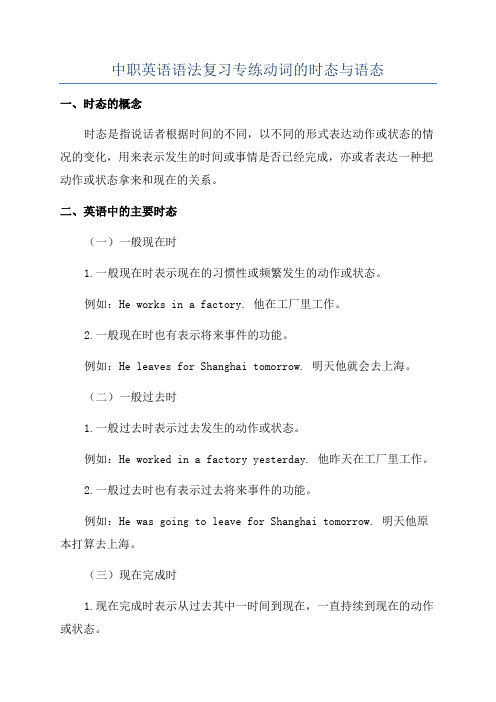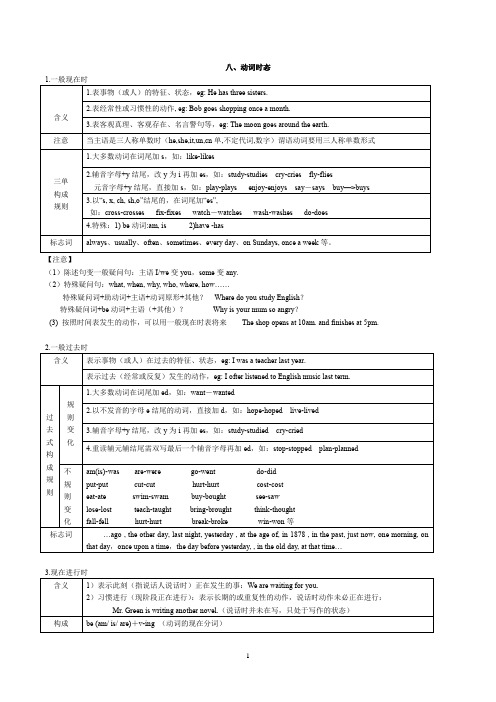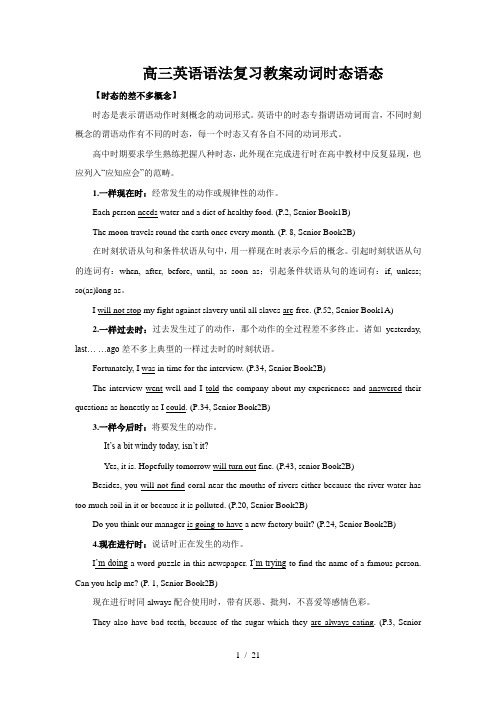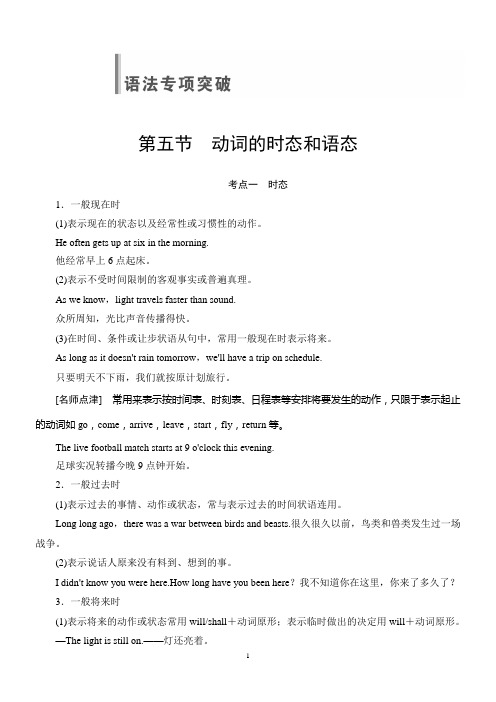语法专项复习动词时态语态
语法复习-谓语动词的时态+语态(共83张PPT)

现在 过去 将来
一般
进行时
完成时
一般现在时: 现在进行时:
原形(do)
am/is/are doing
第三人称单数形
式(does)
现在完成时: have / has done
一般过去时:
一般过去式 (did)
过去进行时: 过去完成时: was / were doing had done
一般将来时:
1)will do
drop, fit, nod, dig, forget, regret, rid】 • 4)以 y 结尾的动词,直接加 ing • 5)以ie结尾的动词,把ie改为y ,再加ing
动词的ing形式
• run_____ • swim____ • sit ____
• stop_____ • have_____ • dance_____ • organize____
②③不适合语法填空中填 动词的适当形式。
一般将来时的用法
1. He will graduate from Harvard University next year.
2. I am going to buy a new laptop this winter. 3. The car is going to turn over. 5. I am to take over the job. 6. The conference is about to begin.
过去 将来
现在
将来
现在 过去 将来
一般
进行时
完成时
一般现在时: 现在进行时:
原形(do)
am/is/are doing
第三人称单数形
式(does)
中职英语语法复习专练动词的时态与语态

中职英语语法复习专练动词的时态与语态一、时态的概念时态是指说话者根据时间的不同,以不同的形式表达动作或状态的情况的变化,用来表示发生的时间或事情是否已经完成,亦或者表达一种把动作或状态拿来和现在的关系。
二、英语中的主要时态(一)一般现在时1.一般现在时表示现在的习惯性或频繁发生的动作或状态。
例如:He works in a factory. 他在工厂里工作。
2.一般现在时也有表示将来事件的功能。
例如:He leaves for Shanghai tomorrow. 明天他就会去上海。
(二)一般过去时1.一般过去时表示过去发生的动作或状态。
例如:He worked in a factory yesterday. 他昨天在工厂里工作。
2.一般过去时也有表示过去将来事件的功能。
例如:He was going to leave for Shanghai tomorrow. 明天他原本打算去上海。
(三)现在完成时1.现在完成时表示从过去其中一时间到现在,一直持续到现在的动作或状态。
例如:He has worked in a factory for 10 years. 他在工厂已工作 10 年。
2.现在完成时也有表示过去将来事件的功能。
例如:He had planned to leave for Shanghai tomorrow. 他原本计划明天去上海。
(四)现在进行时1.现在进行时表示正在发生的动作或状态。
例如:He is working in a factory. 他正在工厂里工作。
2.现在进行时也有表示将来时间发生的动作或状态的功能。
例如:He is going to leave for Shanghai tomorrow. 明天他将去上海。
(五)过去进行时1.过去进行时表示过去正在发生的动作或状态。
初中英语语法专项8动词的时态和语态

【中考考点】
(1)动词的第三人称单数形式、过去式、过去分词和现在分词的构成。 (2)动词的八种时态的基本结构及用法。 (3)动词的被动语态的基本结构及用法。 (4)动词的主动形式表示被动意义的用法。
动词的时态
考点一 一般现在时
1.结构 一般现在时主要用动词原形表示(当主语是第三人称单数时,谓语动词用第三人称单数形式)。 2.动词的第三人称单数形式变化规则 (1)直接加-s。如:work—works (2)以“辅音字母+y”结尾的词,先变y为i,再加-es。如:carry—carries, cry—cries, try—tries, study—studies (3)以s, x, o, ch, sh结尾的词加-es。如: pass—passes, fix—fixes, go—goes, do—does, teach—teaches, wash—washes (4)特殊:have—has, are—is
动词的时态
考点四 过去将来时
1.结构 would+动词原形 was/were+going to+动词原形 2.用法 表示从过去的某一时刻看,将要发生的动作。 His uncle said that there would be a good harvest the next year.他叔叔说第二年会有一个 好收成。 【注意】 在由if引导的条件状语从句中,如果主句用过去将来时,那么if从句需用一般过去时代替过 去将来时。 If he were here, he would show us how to do it. 如果他在这儿,他就会向我们展示该如何做。
动词的时态
4.动词过去式的变化规则 (1)一般情况下,在动词原形后加-ed。如: watch—watched (2)以不发音的字母e结尾的加-d。如:live—lived (3)以“辅音字母+y”结尾的,变y为i,再加-ed。如: study—studied, carry—carried, cry—cried (4)以重读闭音节结尾,且末尾只有一个辅音字母的,先双写该辅音字母,再加-ed。如: stop—stopped, plan—planned, prefer—preferred (5)不规则动词的过去式需特殊记忆。
高考英语语法专项---动词时态语态(含解析)

高考英语动词时态语态(含解析)1、The teacher, with 6 girls and 8 boys in her class, _____ visiting a museum when the earthquake struck.A.were B.Was C.had been D.would be2、In such dry weather, the flowers will have to be watered if they ____________A. have survivedB. are to surviveC. would surviveD. will survive3、I first met Mr. Smith in America. He ______ at Stanford University then.A. studiedB. has studiedC. is studyingD. was studying4、They won’t buy new clothes because they ______ money to buy a new house.A. saveB. are savingC. have savedD. were saving5、So far this year we ______ a fall in house prices by between 5 and 10 percent.A. sawB. seeC. had seenD. have seen6、By the time he realizes he ____into a trap, it’ll be too late for him to do anything about it.A. walksB. walkedC. has walkedD. had walked7、---Do you have any problems if you ___this job?---Well, I’m thinking about the salary.A. offerB. will offerC. are offeredD. will be offered8、—Did you see a man in black pass by just now?—No, sir. I ___ a newspaper.A. readB. was readingC. would readD.am reading9、I_____ in London for many years, but I’ve never regretted my final decision to move back to China.A. livedB. was livingC. have livedD. had lived10、.Mr. Li_____a secretary for five years in the company, and now he is the general manager of it.A. isB. wasC. had beenD. has been11、He _____the job well, but he ____so careless.A. had done; had beenB. could do; wasC. could have done; wasD. hadn’t done; had been12、They said good-bye, hardly knowing that they ______again.A. were never metB. will never meetC. never metD. were never to meet13、. All of the guests ___________ by 9 o’clock , but the host _____________ until 15 minutes later .A. arrived; didn’t turn upB. had arrived; didn’t turn upC. arrived; hadn’t turned up D .had arrived; hadn’t turned up14、He ______ at the meeting, but his heart attack prevented him.A. will speakB.is going to speakC. had to speakD.was going to speak15、In fact, more and more people ____ to live a greener, healthier and more environmentally “green life”.A、choseB、chooseC、are choosingD、have chosen16、The pen my father sent me as my birthday gift very well.A.is writtenB. writesC. writingD. has written17、In such dry weather the flowers will have to be watered if they _____.A. have survivedB. would surviveC. are to surviveD. will survive18、Although medical science control over several dangerous diseases,what worries usis that some of them are returning.A.achieved B.has achieved C.will achieve D.had achieved19、--- I think the waiter has forgotten us. We ________ here for over half an hour!--- I think you’re right. He probably thinks we have already ordered.A.are waiting B.have been waitingC.have waited D.will wait20、The new secretary is supposed to report to the manager as soon as she _______.A. will arriveB. arrivesC. is going to arriveD. is arriving21、If you ____________ stop smoking, you can only expect to have a bad cough.A. won’tB. would notC. do notD. can not22、Months ago we sailed ten thousand miles across this open sea, which______ the Pacific, and we met no storms.A. was calledB.is calledC. had been calledD. has been called23、I’d rather you did some social research when you are free, but you _____.A. didn’tB. weren’tC. wouldn’tD. don’t24、You ______ television. Why not do something more active?A. always watchB. are always watchingC. have always watchedD. have always been watching25、. —Do you know if the football game has started yet?—Started? It must be certain who ________ by now.A. is winningB. winsC. has wonD. would win26、Once our supplies _______, we will take the risk of starving to death.A. have dried outB. are given outC. have dried upD. have been run out27、—Such a mistake could have been avoided.—Unfortunately, he _______ the mistake again and again.A.repeated B. would repeatC.had repeated D. would have repeated28、---- “Alice, why didn't you come yesterday?”----- “I______, but I had an unexpected visitor.A. hadB. wouldC. was going toD. did29、---- “I haven't heard from Henry for a long time.”------ “What do you suppose_____ to him?A. was happeningB. to happenC. has happenedD. had happened30、My pain _____ obvious the moment I entered the office,for the first man I met asked pitifully,“Are you feelingall right?”A.could be B.could have been C.must be D.must have been31、Let’s keep to the point or we ______ any decisions.A. will never reachB. have never reachedC. never reachD. never reached32、—Has Sam finished his homework today ?—I have no idea. He ______ it this morning.A. didB. has doneC. was doingD. had done33、—If the traffic hadn’t been so heavy, I could have been back by 6 o’clock.—What a pity ! Tina _____ here to see you.A. isB. wasC. would beD. has been34、—It is around 100 years, known to us all, ______ the first modern Olympic Games was held.—It really is. But were _____ ?A. that; was thatB. since; was itC. after; is thatD. when; is it35、—We __that you would fix the TV set this week.—I’m sorry. I __to, but I’ve been too busy.A. had expected;had intendedB. are expecting;had intendedC. expect;intendD. expected;intend36、I didn’t like Aunt Lucy, who__without warning and bringing us presents.A. always turned upB. has always turned upC. was always turning upD. was always turned up37、. I think you must be mistaken about seeing him at the theatre; I’m sure he _____ abroad all week.A. isB. wasC. has beenD. had been38、—He _____to the meeting. Have you informed him of it?—Sorry. I______to.A. hasn’t come; am goingB. didn’t come; have forgottenC. hasn’t come; forgotD. doesn’t come; will have39、—Why ! Where's my passport? Maybe I left it on the plane.--My Goodness ! You ____________ things behind.A. had never leftB. didn't leaveC. never leftD. haven’t left40、—Did you watch the basketball match yesterday?—Yes, I did. You know, my brother _________ in the match.A. is playingB. was playingC. has playedD. had played参考答案1、B2、B解析:此句的主句是将来时,条件状语从句要用一般现在时表示将来时。
2023年英语中考语法总复习—8.动词时态和语态

八、动词时态【注意】(1)陈述句变一般疑问句:主语I/we变you,some变any.(2)特殊疑问句:what, when, why, who, where, how……特殊疑问词+助动词+主语+动词原形+其他?Where do you study English?特殊疑问词+be动词+主语(+其他)?Why is your mum so angry?(3) 按照时间表发生的动作,可以用一般现在时表将来The shop opens at 10am. and finishes at 5pm.【注意】(1)always也可用于现在进行时,表示一种强烈的感情色彩,译为“总是”He is always telling lies.(2)某些特殊动词不能用于现在进行时。
① have当“有”讲时,不能用现在进行时。
I have two books now.②“belong to” The two people belong to me now.③表示“心理活动/状态/感觉”的词I want a dog now.① be going to主要用于:主观判断(1)表示事先经过考虑、安排好打算要做的事情:I’m going to play the violin.(2)表示根据目前某种迹象判断,某事非常有可能发生(有迹象表明要发生的事)。
Look!There come the dark clouds. It is going to rain.② will主要用于:(1)客观上将来势必发生的事情, 未经事先考虑, 临时决定的They will go to visit the factory tomorrow.(2)表示不以人的意志为转移的自然发展的未来的事:Today is Saturday. Tomorrow will be Sunday.(3)表意愿。
问对方是否愿意做某事或表示客气地邀请或命令:Will you please turn on the radio?(1) have/has been to “去过已回”She has been to Japan twice.have/has gone to. “去了未回”Where is your twin sister? She has gone to Japan.have/has been in “待在某地” She has been in Japan for 2 years. (2) 动词从词义上可以分为延续性和非延续性两种。
高三英语语法复习教案动词时态语态

高三英语语法复习教案动词时态语态【时态的差不多概念】时态是表示谓语动作时刻概念的动词形式。
英语中的时态专指谓语动词而言,不同时刻概念的谓语动作有不同的时态,每一个时态又有各自不同的动词形式。
高中时期要求学生熟练把握八种时态,此外现在完成进行时在高中教材中反复显现,也应列入“应知应会”的范畴。
1.一样现在时:经常发生的动作或规律性的动作。
Each person needs water and a diet of healthy food. (P.2, Senior Book1B)The moon travels round the earth once every month. (P. 8, Senior Book2B)在时刻状语从句和条件状语从句中,用一样现在时表示今后的概念。
引起时刻状语从句的连词有:when, after, before, until, as soon as;引起条件状语从句的连词有:if, unless; so(as)long as。
I will not stop my fight against slavery until all slaves are free. (P.52, Senior Book1A)2.一样过去时:过去发生过了的动作,那个动作的全过程差不多终止。
诸如yesterday, last… …ago差不多上典型的一样过去时的时刻状语。
Fortunately, I was in time for the interview. (P.34, Senior Book2B)The interview went well and I told the company about my experiences and answered their questions as honestly as I could. (P.34, Senior Book2B)3.一样今后时:将要发生的动作。
语法解析动词时态和语态

语法解析动词时态和语态动词是语法中一个非常重要的词类,它在句子中负责表达动作、状态、事件的发生或存在。
动词的时态和语态是我们在学习和使用动词时需要重点关注的两个方面。
本文将对动词的时态和语态进行详细的解析和讨论。
一、动词的时态动词的时态指的是动作发生的时间,主要分为一般现在时、一般过去时、一般将来时等几种。
1. 一般现在时(Simple Present Tense)一般现在时表示经常性或习惯性的动作、客观真理、科学事实等。
例如:- He reads books every day.(他每天都读书。
)- Water boils at 100 degrees Celsius.(水在100摄氏度时煮沸。
)2. 一般过去时(Simple Past Tense)一般过去时表示过去某个时间发生的动作或存在的状态。
例如:- They went to the park yesterday.(他们昨天去了公园。
)- Mary studied English when she was in college.(玛丽上大学时学习了英语。
)3. 一般将来时(Simple Future Tense)一般将来时表示将来某个时间将要发生的动作或存在的状态。
例如:- I will travel to Beijing next month.(我下个月将去北京旅行。
)- They are going to have a party tonight.(他们今晚将举办一个派对。
)除了上述的三种基本时态,动词还有一些其他的时态形式,如现在进行时、过去进行时、将来进行时、现在完成时、过去完成时、将来完成时等。
这些时态形式在表达不同的情况和语境时使用,可以增强句子的准确度和表达力。
二、动词的语态动词的语态指的是动作的主体和所受到的影响,主要分为主动语态和被动语态两种。
1. 主动语态(Active Voice)主动语态表示主体执行动作或发生状态。
英语语法专项突破(动词的时态和语态)超实用,特别推荐

第五节动词的时态和语态考点一时态1.一般现在时(1)表示现在的状态以及经常性或习惯性的动作。
He often gets up at six in the morning.他经常早上6点起床。
(2)表示不受时间限制的客观事实或普遍真理。
As we know,light travels faster than sound.众所周知,光比声音传播得快。
(3)在时间、条件或让步状语从句中,常用一般现在时表示将来。
As long as it doesn't rain tomorrow,we'll have a trip on schedule.只要明天不下雨,我们就按原计划旅行。
[名师点津]常用来表示按时间表、时刻表、日程表等安排将要发生的动作,只限于表示起止的动词如go,come,arrive,leave,start,fly,return等。
The live football match starts at 9 o'clock this evening.足球实况转播今晚9点钟开始。
2.一般过去时(1)表示过去的事情、动作或状态,常与表示过去的时间状语连用。
Long long ago,there was a war between birds and beasts.很久很久以前,鸟类和兽类发生过一场战争。
(2)表示说话人原来没有料到、想到的事。
I didn't know you were here.How long have you been here?我不知道你在这里,你来了多久了?3.一般将来时(1)表示将来的动作或状态常用will/shall+动词原形;表示临时做出的决定用will+动词原形。
—The light is still on.——灯还亮着。
—Sorry,I'll go and turn it off.——很抱歉,我这就去关掉。
(2)be going to表示按计划、打算要做某事,此外,还可以表示根据现在的迹象对未来做出判断。
- 1、下载文档前请自行甄别文档内容的完整性,平台不提供额外的编辑、内容补充、找答案等附加服务。
- 2、"仅部分预览"的文档,不可在线预览部分如存在完整性等问题,可反馈申请退款(可完整预览的文档不适用该条件!)。
- 3、如文档侵犯您的权益,请联系客服反馈,我们会尽快为您处理(人工客服工作时间:9:00-18:30)。
Revision of Unit 2*due to1)The flight will arrive late due to the heavy fog.2)When is the next train due?3)Please let me know when the rent is due in advance.4)The strike is due to begin on Tuesday.be due to do*let out1.透露,泄露有人把这个消息透露出去了。
Someone has _______ _______ ________ ________.他透露说他要离开中国了。
He _______ _______ _______ he were going to leave China.2.发出(叫声)let out a cry / a scream / a groan3.出租他按天计算出租他的车。
He _______ _______ his car ______ _______ day.他们决定以低租金把那些较小的办公室租出去。
They decided to ________ _______the smaller offices _____ low rents.4.(把衣服)放大,放长这衣服要放大了我才好穿。
I’ll have to ________ ________ the coat _________ I can wear it.她长胖了,裙子要放大了才行。
Since she has gained weight, the dress has to _____ ______ _______.let in1.漏水This roof lets in the rain.The boat let in water2. sb be let in 被欺骗=leave out1.遗漏,漏掉你这一段漏掉了两行。
You have ________ ________ ________ ________ from this paragraph.她在她的叙述中漏掉了一个重要的细节。
She _______ ________ _________ ___________ ________in her account.2.删掉,我希望你别把这个句子删掉I hope you won’t _________ _________ this sentence.He accidentally _____ that he had quarrelled with his wife and that he hadn’t been home for a couple of weeks.A. let outB. took careC. made sureD. made outThe teacher stressed again that the students should not _________any important detail while retelling the story.A. bring outB. let outC. leave outD. make outIt’s a pity that nowadays there are still many children who ____ of school due to lacking money in some poor areas.A. leave outB. drop outC. make outD. let outSeeing the sun rising above the surface of the sun, we _____ a cry of joy.A. gave outB.leave outC.let outD.make outThe sun ________ much heat in the daytime.A.gave outB. leave outC.let outD.make outDon’t ______ any letter in the word, or it will express a different meaning.A. give outB. find outC. leave outD. look outJohn has put on so much weight recently that his mother has to _____ all his trousers to his measure.A.let outB.give awayC.bring inD.make up *involveinvolve (doing) sth 包含,必须……当门卫这个工作我必须整天呆在工厂里My job_______ a guide _________ _________ in the factory all day.这份工作工作量很少。
The job _________ _________ _________.接受这份工作必须常住国外__________ the job _________ __________ __________. invovle sb (in sth)be involved in 牵涉,牵连,参与此次罢工有200个人参加。
The strike _________ _________ __________.200 people __________ _________ ________ the strike.别把我牵涉到你们的争吵中。
Don’t _________ me ___________ your quarrel.I don't want to ________ ________ _______ your quarrel.作为一个精力充沛的学生,他参加学校的各项活动。
As an energetic student, he is invovled in all kinds of school activities.As an energetic student, he_________ _________ ________ all kinds of school activities.* addiction (常与to 连用)成瘾,沉溺,入迷be/become addicted to (doing) sth他的酒瘾毁了他的一生.His _________ _________ alcohol ruined his life.是什么是他玩电脑游戏如此上瘾?What has made him so__________ __________ __________ computer games.People ________ to online shopping always spend a large sum of money on useless things every month.A. are addictedB.being addictedC.addictionD.addicted语法专项复习(一)动词时态、语态1. ---Where is Tom? ---- Well, he ______ you ______ here. Otherwise he would come down right now.A. doesn’t know; areB. hasn’t known; areC. didn’t know; wereD. hadn’t known; were2. ---- Where have you been recently?--- I ______ in Huangzhou on business for a week last month.A. wasB. have beenC. had beenD. had gone3. Turn on the television or open a magazine and you _____ advertisements showing happy families.A. often seeB. are often seeingC. will often seeD. have often seen4. He traveled to many mountain villages and saw many poor children out of school. This experience _______ his life.A. was changingB. was to changeC. would changeD. had changed5. I can guess you were in a hurry. Y ou ____ your sweater inside out.A. are wearingB. were wearingC. woreD. had worn6. ---Jim, have you finished reading Harry Potter and the Half- Blood Prince? ---No. I ____ my father on the farm all day yesterday.A. am helpingB. was helpingC. have been helpingD. had been helping7. ---Could you give these books to Mr. Green?---Certainly. ____ him about something else in any case, so it won’t be any bother.A. I may seeB. I seeC. I can seeD. I’ll be seeing8. The last few months _____ an attractive subject appearing in the news more and more; the Olympic Games.A. seeB. are seeingC. sawD. have seen9. --- Sadam, the former president of Iraq, was caught at last.--- Really? Where _____ himself?A. has he hiddenB. had he hiddenC. was he hiddenD. has he been hiding10. --- Is Tom still smoking?--- No. By next Saturday he ____ for a whole month without smoking a single cigarette.A. will goB. will have goneC. will have beenD. has been going11. --- Have you thought of a topic for your article yet?--- No, I _____ a lot about it, but I haven’t decided.A. will thinkB. was thinkingC. have been thinkingD. had thought12. In this experiment, they were woken up several times during the night, and asked to report what they _____.A. have just been dreamingB. had just been dreamingC. are just dreamingD. had just dreamt13. --- You’d better keep quiet in class.--- Sometimes I ______. Yesterday, I was very quiet during my English class.A. doB. didC. wouldD. have14. --- Have you received any letters recently?--- Yes. I _____ letters and cards many times while I was in Italy.A. receivedB. would receiveC. have receivedD. had received15. I know how it _____: if she doesn’t tell him the truth now, he’ll simply keep on asking her until she ______.A. is; will doB. has been; would beC. will be; doesD. be; has done16. Nobody could have guessed in those days the place in Chinese history Zhang Jian _______.A. was havingB. was to haveC. had hadD. had17. --- I believe whoever gets the job will be well paid.--- Then why don’t you take it?--- Well, I _______ about it.A. just thinkB. am just thinkingC. just thoughtD. was just thinking18. --- Fined $ 20! Y ou know you ______ 100km an hour, don’t you?--- No, officer. I can’t have been. This car doesn’t do 80.A. are drivingB. were drivingC. have drivenD. had driven19. The train _____ at the present speed until it reaches the foot of the mountain at about nine o’clock tonight.A. goesB. wentC. is goingD. will be going20. --- Susan married Johnson last Sunday.--- Really? How long _______ each other?--- No more than a week, I’m afraid.A. have they knownB. had they knownC. have they got to knowD. had they got to know21. By the time he leaves university, he ______ much work experience so long as he takes a part-time job.A. will have gainedB. has gainedC. may have gainedD. will gain22. I haven’t seen Mary these past few days. I’m afraid she ____ herself for some time.A. isn’t feelingB. wasn’t feelingC. hasn’t been feelingD. hadn’t been feeling23. After driving for thirty miles, he suddenly realized that he ____ in the wrong direction.A. droveB. was drivingC. has been drivingD. had been driving24. The article suggests that when a person _____ under unusualstress he should be especially careful to have a well-balanced diet.A. beB. isC. wasD. were25. --- Miss. King _____ music at a high school for five years and now is an actress. --- No wonder I often hear her sing in the garden.A. is teachingB. has been teachingC. taughtD. had taughtAnswers:AACBA BDDBB CBAAC BBBDB ACDBCRevisionMike stayed in the hotel for two weeks____ ____ ____ _____ _____ ____ Mike stayed for two weeks? _____ _____ ____ ____ stayed in the hotel for two weeks?_____ _____ _____ ____ Mike stayed for two weeks?____ ____ ____ ____ ____ Mike stayed in the hotel?到第二天我才听说事情的真相。
